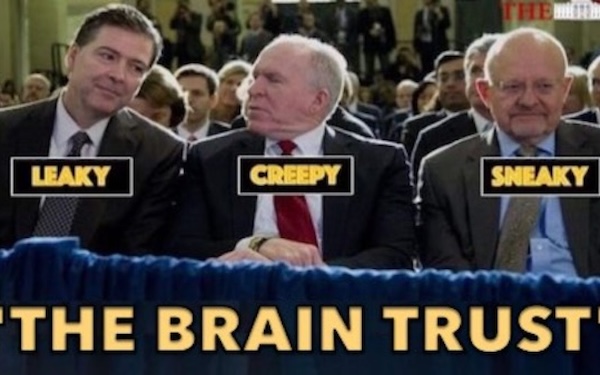During his first presidential campaign, Donald Trump faced more than Hillary Clinton. A book by a former CIA officer who also worked in other intelligence agencies reported that “leftist political policies implemented under former President Barack Obama” waged political warfare against then-candidate Donald Trump in the run-up to the 2016 election.
The Washington Times covered the book, “Neutering the CIA: Why U.S. Intelligence Versus Trump Has Long-Term Consequences,” published in July 2023. Former intelligence officer John Gentry reported how the leftist-trained intelligence agencies attempted to skew the election results toward Clinton and how that behavior was a danger to the future of the U.S.
 Gentry’s claim should not be surprising as reports about intelligence agencies trying to trip up the Trump campaign even through his administration. Trump even claimed his campaign was being spied on by the Obama team. Of course, the mainstream media made fun of Trump’s claim and refused to investigate, but those who took the time to investigate the claim found Trump was being truthful.
Gentry’s claim should not be surprising as reports about intelligence agencies trying to trip up the Trump campaign even through his administration. Trump even claimed his campaign was being spied on by the Obama team. Of course, the mainstream media made fun of Trump’s claim and refused to investigate, but those who took the time to investigate the claim found Trump was being truthful.
In March 2017, there were reports of a “smoking gun” proving that Trump was spied upon by the intelligence agencies—that wasn’t the only report. Also, in March 2017, we saw evidence of Trump possibly being wiretapped by Obama. Obama’s intelligence team was pushed to get & spread intelligence on Trump after the election and before he took over.
Those are only a few of the many news reports backing up the claims in Gentry’s book.
“A new, dramatically stronger and damaging form of politicization — partisan, political activism willing to damage or destroy politically, a sitting American president — had taken root in parts of the U.S. intelligence community,” Mr. Gentry writes. “It dwarfs the politicization episodes of the past in magnitude and importance, and it promises to have lasting, negative consequences.”
Mr. Gentry said his expose is not meant as a defense of Mr. Trump, who criticized intelligence agencies as a candidate and as president. The point of the book is to highlight how ideological opposition to Mr. Trump damaged the spy agencies themselves.
Last summer, when asked about politicization at his agency, CIA Director William Burns said his obligation “is to offer the best intelligence that we can collect and analyze straight up, even when that’s inconvenient to policymakers.” And we are expected to believe that hogwash. Sadly, Americans have observed Obama’s intelligence agencies, as well as all agencies under the Justice Department umbrella, place politics before their actual responsibilities.

Gentry blames Obama for politicizing intelligence. It’s not that difficult to understand where he got the idea for that. Mr. Obama served from 2009 to 2017, and his appointees “made and institutionalized significant changes, largely by creating new structures, policies, and incentives designed to alter organizational cultures in ways congruent with Obama’s political agenda,” Mr. Gentry said.
For instance, he said, the Obama administration hired Democratic activists who “shifted leftward the collective, politically salient worldview of the intelligence bureaucracy.”
Gentry concludes with similar claims made by other former Obama intelligence officers.
There is no truth in the rumor that intelligence officers have claimed Gentry’s claims were the product of Russian disinformation.






